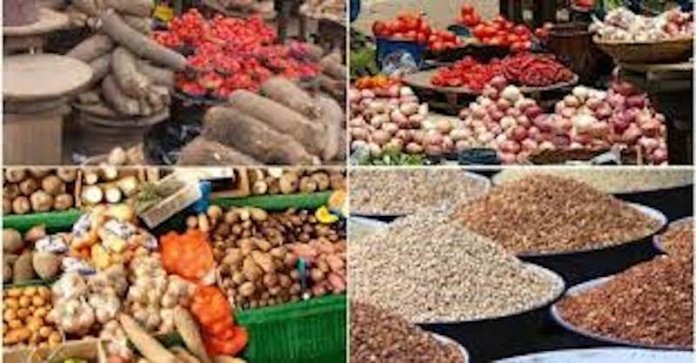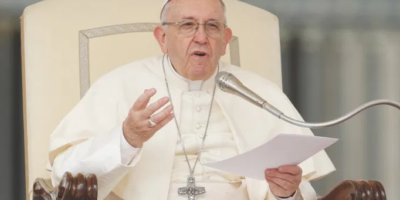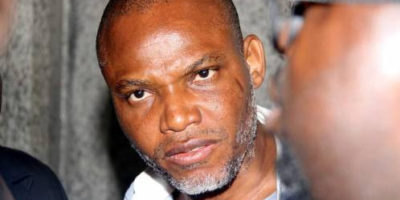High Food Prices: FG Directs Release Of 40,000mt Of Grains To Nigerians

- Says insecurity hasn’t depleted nation’s food production capacity
- Food crisis looms, Okonjo-Iweala warns
- WTO reduces 2022 global trade forecast to 3%
President Muhammadu Buhari has given the go-ahead for the release of 40,000 metric tons of assorted grains to needy Nigerians from the nation’s Strategic Grains Reserve (SGR).
Minister of Agriculture and Rural Development, Dr. Mohammed Abubakar, made this known to newsmen yesterday, after a close-door meeting with President Buhari at the State House, Abuja.
This is just as the Director General of World Trade Organisation (WTO), Dr. Ngozi Okonjo-Iweala has warned that a potential food crisis was looming across the globe, especially for some African countries that relied on Russia and Ukraine for their food import.
According to Abubakar, the execution of the president’s order would be carried out by his ministry, in conjunction with the Ministry of Humanitarian Affairs, Disaster Management and Social Development, which would handle the distribution of about 12,000 metric tons of the total number.
He added that the same process deployed during the COVID-19 lockdown in 2020, to distribute 70,000 metric tons of assorted food items across some states and the Federal Capital Territory (FCT), would be used.
Abubakar stated that in compliance with the presidential directive, grains are readily available for immediate distribution.
The minister explained:
I’m here this afternoon as a result of summoning by President Muhammadu Buhari. He actually directed and approved the release of grains from our Strategic Grain Reserve by the Federal Ministry of Agriculture and Rural Development.
This is to cushion the effect of some of the issues we are facing with high prices of commodities across the country and also to cushion these festivities – Ramadan, Easter, Salah – so that there will be a little cushion for the people during these festivities.
Not just us, the Federal Minister of Agriculture and Rural Development, but also that we’ll be given some of these grains also to the Ministry of Humanitarian Affairs to also do the same distribution, the grain is coming from our Strategic Grains Reserve, as directed by Mr. President.
On the kind of grains Nigerians should be expecting to receive, the minister said,
assorted grains. Usually we have sorghum, maize, millet and the rest of them, we will be releasing an assortment of grains that are in our grain reserves.
They are located across the entire country in all probably the six geopolitical zones, we have grain silos.
Commenting on the effect of insecurity in the north-west and north-east on the nation’s food security, Abubakar disclosed that government was doing everything humanly possible to prevent a drop in food production, adding that there had not been any impact on food supply so far.
His words:
Certainly, some measure of insecurity might affect a bit of agriculture, however, as you can see, there’s really no sharp drop in productivity in agricultural production. There’s still food, and people are still cultivating in all parts of the country.
Some of the areas where it has some security implication, yes, it may have a little drop, but the government is doing everything humanly possible to make sure that production continues in other parts and even areas where there are issues, the government is doing whatever it takes.
Like in the Ministry of Agriculture, we have Agro Rangers who sometimes provide some kind of security cover that will make sure food production does not stop. I can assure you that we don’t have problems with food production at this point.
Commenting on the effects of the Ukraine – Russia war, he said:
We have met about two to three times to discuss the issue of Ukraine. Yes, indeed, Nigeria imports grains and other agricultural input from Ukraine, we are making sure that we look inwards and outwards to make sure this conflict does not affect our agricultural sector.
Inwards-looking at fabrication of certain equipment that we can do. Also surveying and looking for areas that we can even produce our own fertiliser because we have the mineral deposits that are precursors to fertiliser production and also other places where we can import, apart from Ukraine.
But the most important thing is to up our own agricultural production and this is without saying that no administration in recent times that has given the agriculture sector such an attention and funding as the current administration of His Excellency, President Muhammadu Buhari,
he said.
Asked about other countries that are being considered as alternative sources of the products sourced from Ukraine, the minister said,
there are countries that produce other grains or the grains that we need, we’re still in the process.
Like I said, we’re also looking inward to see what we can do to cushion the effect. Right now, I cannot give you the names, but it’s something that we will. We will definitely make sure that we have no food shortage in this country.
Food Crisis Looms, Okonjo-Iweala Warns
Meanwhile, Okonjo-Iweala sounded the warning yesterday during a hybrid media briefing on the WTO Trade Forecast, that took place in Geneva.
According to her, the Russia-Ukraine conflict has put the fragile global trade recovery at risk and prompted WTO economists to reassess their projections for world trade over the next two years.
The WTO stated that the world merchandise trade volume was expected to grow three per cent in 2022, as against 4.7 per cent that was previously projected, adding that it would increase to and 3.4 per cent in 2023,
but these figures may be subject to revision due to uncertainty about the course of the conflict in Ukraine.
But commenting on the anticipated food crisis, the director general of WTO said:
This war has seen a sharp spike in the prices of foods, energy, fertiliser and important minerals which Ukraine and Russia supplied to the world market. A potential food crisis is looming.
Food and energy prices were already high by historical standards before the war.
Low income food deficit countries saw their food bills rise 20 per cent in 2021, an increase of over $120 billion. Since early January, according to the International Grain Council, spot prices for wheat have risen as much as 31 per cent before falling back to 21 per cent, which is 20 per cent increase as at last week. Soybeans are up by 14 per cent and barley by more than 30 per cent.
Twenty-five African countries import food from Ukraine, Russia or both. The problem of high food prices is compounded by high fuel prices. An expensive fertiliser represents a threat to future crop yields.
Okonjo-Iweala went on to say that,
the war in Ukraine has created immense human suffering, but it has also damaged the global economy at a critical juncture.
Its impact will be felt around the world, particularly in low-income countries, where food accounts for a large fraction of household spending.
Smaller supplies and higher prices for food mean that the world’s poor could be forced to do without. This must not be allowed to happen. This is not the time to turn inward. In a crisis, more trade is needed to ensure stable, equitable access to necessities.
Restricting trade will threaten the wellbeing of families and businesses and make more fraught the task of building a durable economic recovery from COVID 19.
She said governments and multilateral organisations must work together to facilitate trade at a time of sharp inflationary pressures on essential supplies and growing pressures on supply chains.
History teaches us that dividing the world economy into rival blocs and turning our backs on the poorest countries leads neither to prosperity nor to peace.
The WTO can play a pivotal role by providing a forum where countries can discuss their differences without resorting to force, and it deserves to be supported in that mission,
she said.
She also expressed concern that supply chains that were already strained by the pandemic have been further roiled by the war, and disclosed that,
the WTO is working with shipping companies, port operators, logistics firms and other businesses by identifying specific problems and solutions to supply chain disruption.
Structural issues from labour shortages and under investments in physical infrastructure to insufficient use of digital technology for supply chain oversight and border clearance all did the ground work for today’s woes and need to be addressed.
The director general clarified that the ongoing war in Ukraine has not grounded the activities of the WTO.
She said:
Proceeding at the WTO has not been immured from the challenges resulting from this war. But it is simply inaccurate to say that the WTO has been paralysed since the outbreak of the war. We have developed walk around that have enabled us to conduct business even with diplomatic tensions running high.
However, the WTO stated that World GDP at market exchange rates is expected to increase by 2.8 per cent in 2022 after rising 5.7 per cent in 2021.
It said output growth should pick up to 3.2 per cent in 2023, assuming persistent geopolitical and economic uncertainty.
The trade organisation stated that the,
volume of merchandise trade rose 9.8 per cent in 2021. The US$ value of this trade grew 26 per cent to $ 22.4 trillion. The value of commercial services trade was also up 15 per cent in 2021 to $ 5.7 trillion.
Services trade will also be affected by the conflict in Ukraine, including in the transport sector, which covers container shipping and passenger air transport.

Justin Nwosu is the founder and publisher of Flavision. His core interest is in writing unbiased news about Nigeria in particular and Africa in general. He’s a strong adherent of investigative journalism, with a bent on exposing corruption, abuse of power and societal ills.













